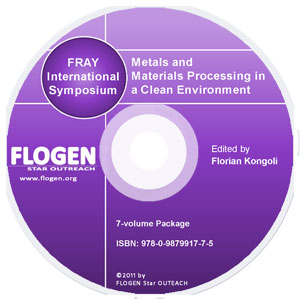
CD shopping page |
2011-Sustainable Industrial Processing Summit
|
| Editors: | Florian K |
| Publisher: | Flogen Star OUTREACH |
| Publication Year: | 2012 |
| Pages: | 630 pages |
| ISBN: | 978-0-9879917-2-0 |
| ISSN: | 2291-1227 (Metals and Materials Processing in a Clean Environment Series) |
Direct Electrochemical Conversion Of Metal Oxides To Metal By Molten Salt Electrolysis: An Overview
Mohandas K.S.1;1INDIRA GANDHI CENTRE FOR ATOMIC RESEARCH, Chennai, India;
Type of Paper: Invite
Id Paper: 410
Topic: 6
Abstract:
Production of metals from metal compounds has been a major activity of human kind from time immemorial and metals played a vital role in shaping the modern world as it is today. With the discovery of electricity in the nineteenth century, electrochemical processes for metal production were developed which enabled the production of many metals that were difficult to be produced by the conventional chemical reduction processes. Electrochemical processes were also suitable for scaling up and hence economical. Extraction of reactive metals from stable metal compounds necessitated the use of molten salt as the solvent medium and the elevated temperature of operation of the molten salt processes helped to increase the product yield significantly. Transition metals and actinides mostly exist as stable oxides in nature and are reduced by using strong reductants. Direct extraction of these reactive metals from the metal oxides is avoided due to the chemical affinity of oxygen with the metal and hence the possible contamination. Often such metals were converted to the halides and the metal halides were chemically reduced to high purity metals. However, Chen et al discovered recently that a metal oxide could be converted directly to the metal by molten salt electrolysis and this triggered worldwide research activities in the new process called ‘FFC Cambridge process’ for extraction of a host of metals from their respective oxides. The unique configuration of the oxide as a solid electrode in the electrochemical process and the oxide to metal conversion taking place in the solid state give considerable advantages to the process but with equal challenges. Removal of oxygen from a solid oxide matrix can be kinetically limiting and this could pose challenges in the large-scale production of metals by the process. The process efficiency will depend a great deal on the design of the metal oxide electrode for faster removal of oxygen. The electro-deoxidation process has potential applications in the nuclear technology and significant efforts are now underway to develop the process for conversion of actinide oxides to metal. Sodium-cooled fast reactor with metal fuel is proposed as one of the future reactor systems in the Generation IV concept and electro-deoxidation process can be used to prepare the fuel metals from spent oxide fuels. The spent oxide fuel is converted to a metallic alloy by the electro-deoxidation process and the alloy is separated from fission products by the molten salt electro-refining technique. In the Advanced Conditioning Process (ACP) being developed by Republic of Korea, electro-deoxidation is also used as a step in the pyroprocessing of spent oxide fuel for reduction of its volume, radiotoxicity and heat load. The paper presents an overview of the electro-deoxidation process and the developments that are taking place in this area in the nuclear and non-nuclear domains. Some of the critical issues of the molten salt process, identified from a technological perspective, will be discussed with inputs from the open literature and author’s work.